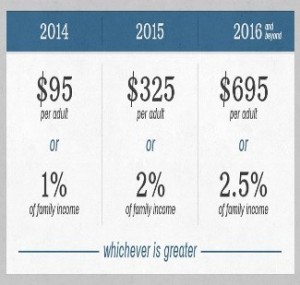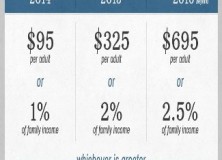 One of Obama’s Health Care’s most controversial elements is the requirement that most Americans carry health insurance or face a fine. The Treasury Department in August released a 75-page guideline detailing what’s expected and who is included.
One of Obama’s Health Care’s most controversial elements is the requirement that most Americans carry health insurance or face a fine. The Treasury Department in August released a 75-page guideline detailing what’s expected and who is included.
The IRS says they will enforce the mandate for “minimal essential coverage” for individuals and businesses, but will they be able to enforce imposing fines and penalties? Read further and you will find out that the fines for not having a health care plan will be difficult to collect from many and the health care plan may not fund itself, as the President planned it to do, by forcing people to pay for coverage.
The fine for people not carrying insurance starts small in 2014, at $95 per person or 1 percent of income, whichever is higher. In 2015, the fine is the higher of $325 per person or 2.0 percent of taxable income until it reaches $695 per person or 2.5 percent of income by 2016. Spouses and dependent children up to the age of 26 must be covered, as well, or the taxpayer is subject to fine.
Initially, paying the fine will be far cheaper than the cost of mandatory insurance, and thus would not act as a strong financial incentive to purchase healthcare. And even though the fine increases sharply after the first year, current trends in rising healthcare costs indicate the fines are unlikely to be as costly as high-end insurance, according to Forbes.
Employers with more than 50 full-time-equivalent employees must offer healthcare to employees and dependents under the age of 26, but are not required to offer coverage for spouses. The employee will have to buy insurance for the spouse under such plans. Employees who do not receive health insurance from their employer will have to buy it for themselves and dependents.
The minimal requirements of essential coverage are low. According to the IRS Code, either the government plan or any other plan legally sold in the state will qualify. Low-cost plans that offer a small range of services will be available to businesses and individuals.
However, the IRS is limited in the ways it can collect the fine. The Affordable Care Act stipulates that taxpayers are not subject to criminal prosecution or penalty for refusing to pay. The IRS cannot place a lien on property, either, as it can when collecting back taxes.
The IRS can’t go after you if you don’t pay the fine
Section 1501(g)(2) of the Affordable Care Act specifies that the IRS cannot subject taxpayers to “any criminal prosecution or penalty” for refusing to pay the mandate fine. Also, in contrast to normal tax levies, the IRS cannot “file notice of lien with respect to any property of a taxpayer by reason of any failure to pay the penalty imposed by this section.”
The only thing the IRS can do to make you pay the mandate fine is to take it out of your withholding, or withhold it from your tax refund, from those who are due a refund. So if you don’t participate in the withholding process, or aren’t due a refund, the IRS has no way to collect the mandate fine.
With all the exemptions, the Health Care Plan may not be self-funding.
If the cost of insurance is more than 8 percent of your income, you may be exempt from the mandate if you buy your own insurance. This is meant to protect low-income older people, who pay more for insurance than young ones. Many older Americans may be exempt from the mandate altogether.
People below the poverty level and who do not file an IRS return are exempt from the mandate.
Paul Houchens, an analyst at Milliman, puts it this way: if you’re 55 years old, and you’re paying $7,800 a year for health insurance, you’ll be exempt from the individual mandate if your income is between 400 percent of the federal poverty level—about $46,000—and $97,500. (If your income is below $46,000, you qualify for at least a partial subsidy of your insurance costs, which, based on the way the law is written, makes the individual mandate apply to you.)
You’re also exempt if you don’t file an IRS tax return. Indeed, if you add up all of these exemptions, MIT economist and Obamacare architect Jonathan Gruber estimates that 40 percent of people who are uninsured are exempt from the individual mandate.
Recognized religious organizations and American Indians are also exempt.
Members of a “recognized religious sect or division,” as specified in Section 1402(g)(1) of the Internal Revenue Code, are also exempt. So, you might be asking yourself: which “religious sects” are exempt?
The Internal Revenue Code exempts an individual from certain taxes if he is “a member of a recognized religious sect or division thereof and is an adherent of established tenets or teachings of such sect or division by reason of which he is conscientiously opposed to acceptance of the benefits of any private or public insurance which makes payments in the event of death, disability, old-age, or retirement or makes payments toward the cost of, or provides services for, medical care,” including Social Security, Medicare, and Medicaid.
Your “sect” has to have been in continuous existence since December 31, 1950, and the Commissioner of Social Security must agree that your sect “has the established tenets or teachings” consistent with opposition to medical benefits. While there are some on the Internet who believe that this religious exemption applies to Islam, it doesn’t appear that way, as Muslims are not exempt from Social Security. Instead, the exemption is meant for groups like the Amish.
So if you really hate the individual mandate, you don’t have to burn your Obamacare card—just join the Amish or an Indian tribe!
Disclaimer: On January 4, 2016, the owner of WestEastonPA.com began serving on the West Easton Council following an election. Postings and all content found on this website are the opinions of Matthew A. Dees and may not necessarily represent the opinion of the governing body for The Borough of West Easton.





